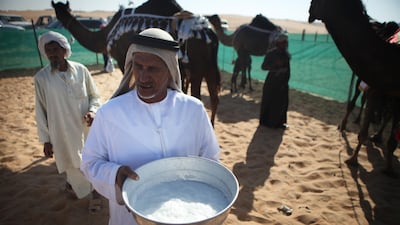The benefits of camel milk against the development of cancer have been studied by researchers at a university in Jordan.
The study, published in the Emirates Journal of Food and Agriculture, is said to be the first to look at the effect of camel milk on the development of colorectal cancer in a whole organism - specifically in mice.
The scientists, from Yarmouk University in Irbid, say their results suggest camel milk could be used as a “complementary approach” to managing colorectal cancer, which is also known as bowel cancer.
However, because the study involved only mice, experts have cautioned against drawing conclusions about the treatment or prevention of colorectal cancer in people.
During the study, 30 mice were given an injection and fed a substance that promoted the development of colorectal cancer.
Some of these animals were also given camel milk whey (the water-like liquid left behind after curd is removed), while another group was given cow milk whey, and a further group received neither.
In a postmortem examination, six out of 10 mice not given any whey were found to have tumours in their colon, while six out of eight of those fed cow milk whey had tumours. Among the mice that had been given camel milk whey, however, just one out of eight had tumours.
The researchers carried out genetic tests on the animals’ tissue and found that, in mice given camel milk whey, genes involved in the production certain proteins associated with inflammation became less active. In these same animals, genes that suppressed the activity of these inflammatory proteins were more active.
Camel milk has long been seen in the Middle East as offering significant health benefits, with the authors of the latest study noting in the paper that it has traditionally been used for the “maintenance of good health and treatment of diverse diseases”.
Compared to the milk of other ruminants, they say it contains less sugar and cholesterol, but has higher mineral content. It is also recognised for its “potent antimicrobial and anti-inflammatory properties”.
“Our data represent a valid rationale for the use of CM [camel milk] as a complementary approach, with nutritional value, safety and no side effects, during management of CRC [colorectal cancer],” the researchers wrote.
Colorectal cancer is one of the most common types of cancer, with 130,000 people having the condition diagnosed each year in the United States, for example. It also causes around 50,000 deaths each year in the US, the second-largest number for any cancer.
Dr Abdul Raziq Kakar, the technical manager for Al Ain Dairy’s camel farm, said camel milk had anti-cancer properties for a number of reasons.
A key reason is that it contains antioxidants. Antioxidants combat oxidative stress, a chemical imbalance associated with the presence of reactive molecules that can damage DNA and cause potentially harmful mutations.

“Camel milk is not only for [controlling] cancer," Dr Kakar said. "It controls diabetes – there are many scientific results."
Experts not connected with the new study, however, cautioned that its results should not be applied to humans.
“It is a study in mice that has little relevance to colorectal cancer in man,” said Prof Thomas Sanders, an emeritus professor of nutrition and dietetics at King’s College London.
While suggesting that it would be “premature” to suggest that camel milk whey had a protective effect against colorectal cancer in people, Prof Tim Key, deputy director of the Cancer Epidemiology Unit at the University of Oxford, said “there is already substantial evidence in humans that dairy products in general may reduce [the] risk” of colorectal cancer.
Julia Frater, a senior cancer information nurse at Cancer Research UK, said the study did "not provide evidence that camel’s milk could either prevent or treat cancer in people”.
“For anyone looking to reduce their risk of bowel cancer, it’s best to stick to the things we know can make a difference, like keeping a healthy weight, cutting down on alcohol, being a non-smoker, eating lots of foods high in fibre, and cutting down on red or processed meats,” she said.


